You won’t want to miss this roundup covering the changes that have come down through the end of March and early April. A huge update has landed, and SEOs have learned many new ways to make the most of AI.
The three biggest stories of the month come first. You’ll get a look into the SEO strategies of the biggest digital goliaths, an analysis of the Google Core Update in 2024, and a message directly from Google about the future of spam policies
Following the top stories, you’ll find other popular releases from last month that competitive SEOs cannot afford to miss. They have advice on building better backlinks, developing better content with AI, and recovering in case the update hits you. Let’s jump in!
Detailed Q3: Analysing The SEO Playbook of Digital Goliaths In-Depth, Every Quarter
Tag: Guide
Glen Allsopp brings you this look at the SEO strategies of the internet’s biggest players. According to Glen, SEO is undergoing some of the biggest shifts he’s seen throughout his career. He tracks some of these shifts through some summaries of the latest moves by large companies making moves.
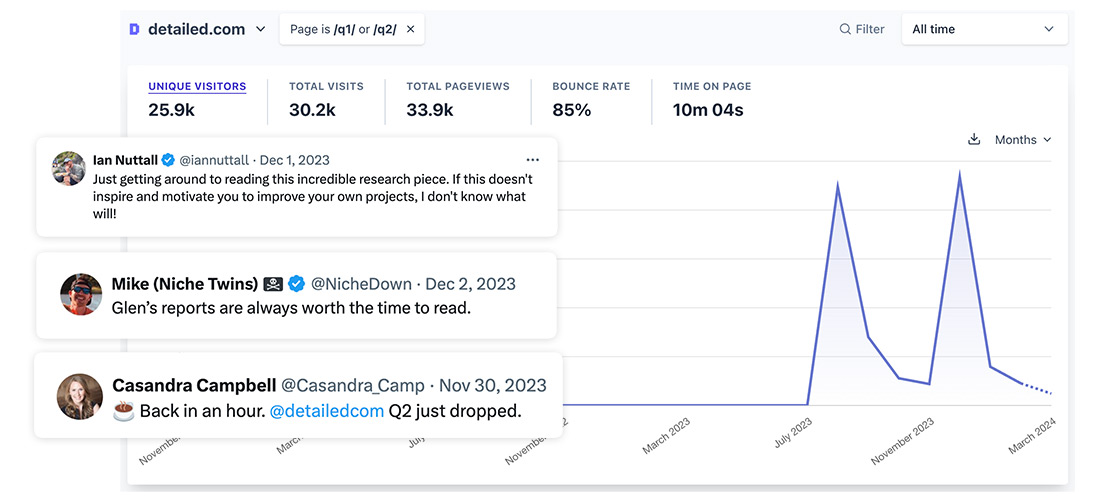
In the first summary, Glen covers the success of NextDoor’s 300,000 pages of AI-generated content. He tracks how the content has performed since the company launched it and finds that the news is quite good. The content was attracting over 150,000 readers a month when last measured.
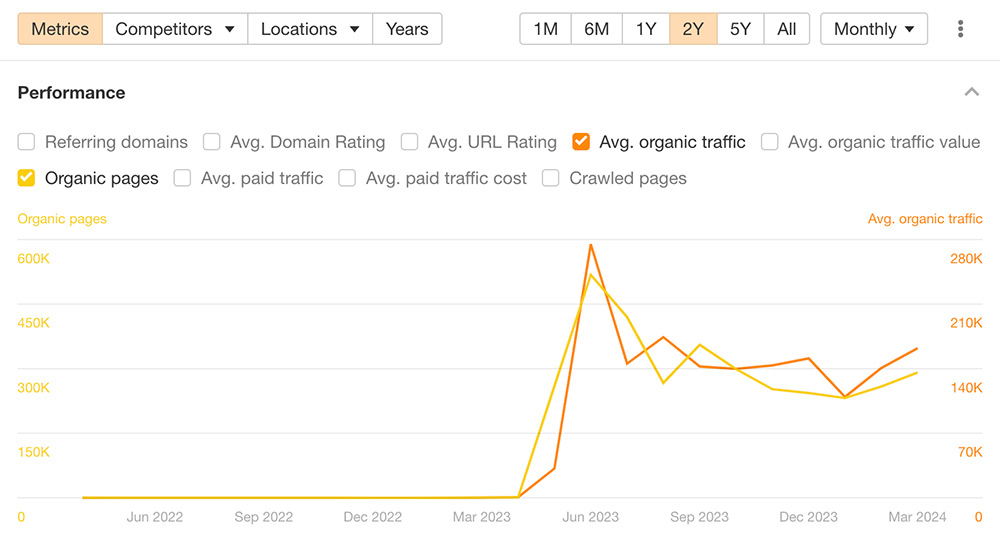
In another summary, he covers Fortune.com’s 25% YoY growth. A significant increase in organic search traffic has helped the website reach 46.8M users worldwide in the most recent quarter.
Throughout the rest of his report, Glen provides detailed summaries of the moves of almost a dozen more major players, including Chegg, Planet Sport, Valet, and M.O.B.A. You’ll learn how these companies managed accomplishments, including buyouts, new tech rollouts, and millions of dollars in revenue for their efforts.
Check out his complete guide to get pages of SEO analysis. However, remember that everyone’s strategies may change in the next quarter to accommodate the latest Google Core Update. In the next piece, you’ll get a video review of what you need to know.
Google Core Update 2024: Is SEO Dead?
https://www.youtube.com/watch?v=qoS-zXSeqs4
Tag: News/Discussion
Julian Goldie brings you his rundown of the most recent core update. He takes you through the sites and owners who were affected, what it may mean for the future of AI content, and what it may mean for the future of AI content.
He starts by looking at some of the sites that were hit. He notes that, unlike some recent updates, AI content does not appear to be getting the special attention it got from the last update. Julian then looks at some examples of affected sites and notes that human-created content is being targeted.
Next, he discusses some reactions from site owners who were hit. He names Niche Site Lady, Jackie Chow, Jesse Cunningham, and others reporting their experiences on Twitter, Reddit, and other SEO hubs.
Julian was himself targeted in this update and had an interesting experience that he discusses in this video. He claims that of all the sites in his GSC, the only ones affected were the ones he owns.
Is Google targeting SEOs by name rather than using algorithms to manage practices? Julian isn’t sure, but he names many other SEO influencer site owners who saw all of their sites hit.
Check out the complete video for more analysis on the Google Core Update, and how it may affect sites that are using some of the latest AI technology. For now, you’re ready to jump into Google’s own rare statement about its intentions for web creators going forward.
What web creators should know about our March 2024 core update and new spam policies
https://developers.google.com/search/blog/2024/03/core-update-spam-policies
Tag: News/Discussion
The Google Search Central Blog brings you this look at their plans for the March Core Update. They let you know that this is one of the most complex updates to come down in years, with changes to multiple core systems.
The changes include an evolution in how the helpfulness of content is judged. The number of signals that point to helpful content have been expanded and elaborated so that the new systems can reinforce one another.

What do all these new systems mean for you? Google claims that content creators already making ‘satisfying content for people’ have nothing to do.
For others, Google has announced many new policies covering a wide swathe of spam. The three new spam policies cover expired domain abuse, scaled content abuse, and site reputation abuse.
Expired domain abuse is the manipulation of Search rankings through the purchase and repurposing of once high-reputation sites for low-value content. Google intends to target this abuse more effectively now.
Scaled content abuse occurs when many nearly identical pages are created for the purpose of manipulating search. Google claims the update now allows for better detection of these sites.
The new restrictions on site reputational abuse target large publishers who allow spammy 3rd-party content to be hosted on their sites without reviewing the value for readers. Google has recently expanded its spam policies page to be clearer about all of these violations.

For now, you’re ready to move to learn how you can build high-value links far more effectively.
How To Get DR 90 Links (Easily)
https://www.youtube.com/watch?v=CLVxdA6L8vQ
Tag: Guide
Mark of The Authority Hacker channel offers this look at how you can attract high-value links without ever needing to beg for a link exchange.
The force behind this strategy is one simple word: “statistics.” As Mark puts it, content creators constantly seek statistics to reinforce their points or add extra credibility to a claim. Results that supply desirable statistics based on a niche term can draw in some high-value links.
One issue with this strategy is that these terms are often competitive. Mark suggests some ways to build content that out-competes the results already competing for these terms. He recommends that you—
Provide your own unique data (an industry survey is an easy way he recommends)
Focus on topics in your own niche to attract responses to surveys
Beautify your result with excellent graphs
He provides you with a list of the steps that Mark and his team followed to create, post, and collect on the unique data that you create. Check out the full video to learn the steps and some tips that can help you use this strategy more effectively.
You’re ready to move to the next big piece for the month. It’s a data study that examines what happened to all the sites that were hit by the September update (hint: nothing good).
Report: No Site Hit By The September Helpful Content Update Recovered Yet
https://www.seroundtable.com/google-helpful-content-recovery-core-update-37095.html
Tag: Case Study
Barry Schwartz brings you this SEO-community-led investigation into how sites have recovered since the September 2023 Helpful Content Update. Barry’s networks were not reporting any recovery, and some reported that visibility was worsening.
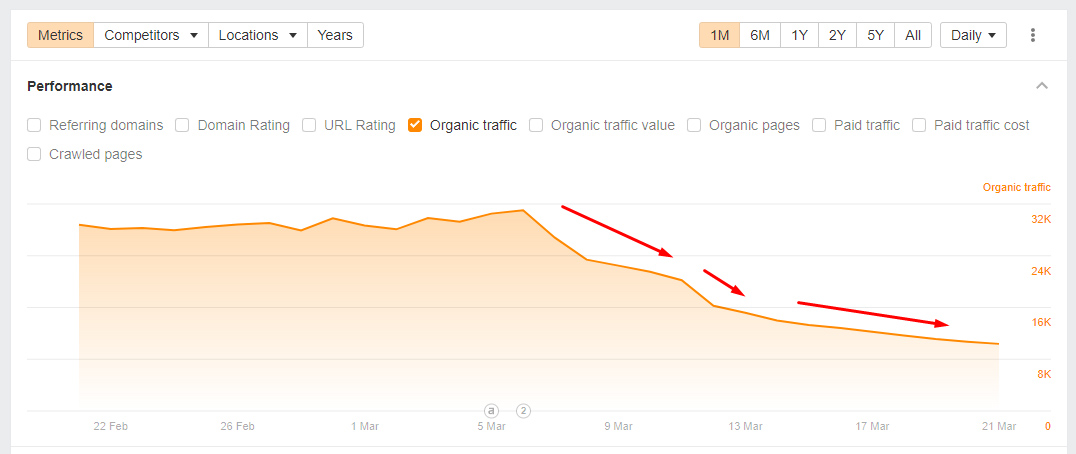
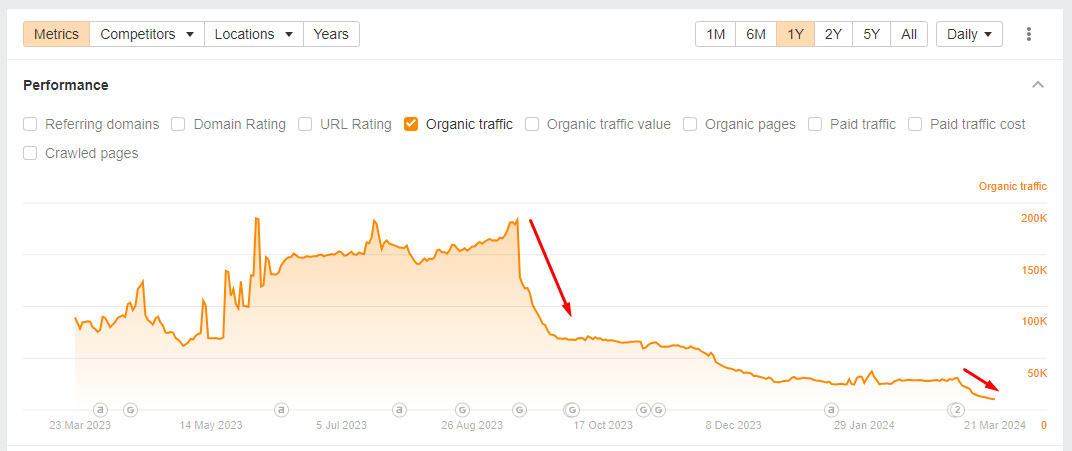
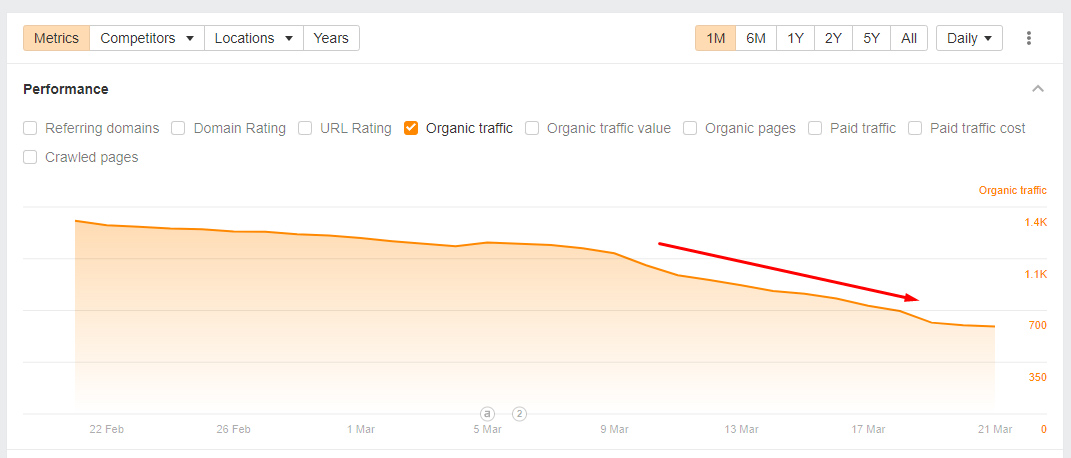
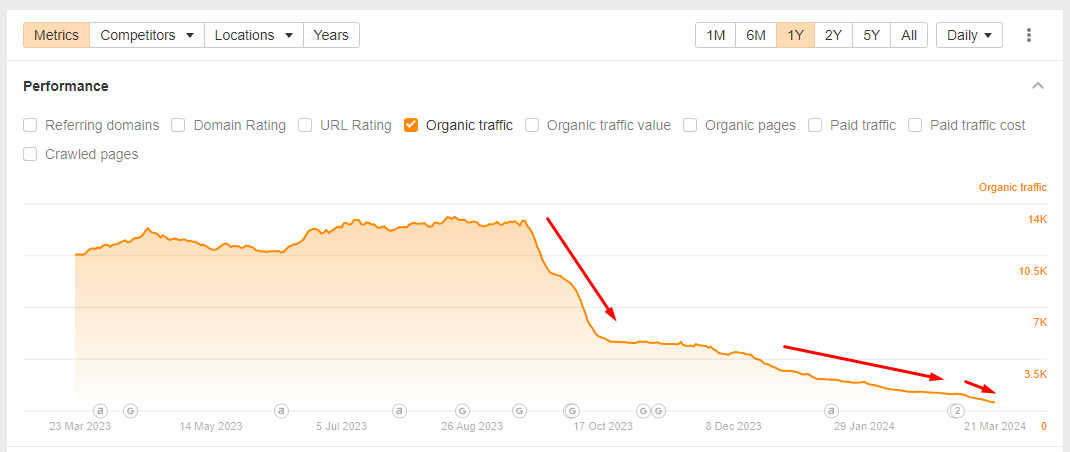
This was backed up by data when Glenn Gabe posted his own data. He had tracked over 200 sites that were originally hit and found that not a single one had recovered before the latest update.
Glenn looked further into the issue and found that the changes were impacting sites that were outside the HCU classifier. He speculates (but doubts) that these sites will receive a reprieve from the latest update.
Any hope for sites that were hit may come with the new content signals being packed into the update. When these new signals are fully implemented, sites that were hit in the past may get content reevaluated with more comprehensive standards.
However, site owners can’t overlook the possibility that the new signals may be even more judgemental of their content than the previous system.
Humanizing your content will be key to delivering a better experience for readers. Next, you’ll learn the steps I use to humanize my ChatGPT content.
How I “Humanize” ChatGPT AI Content…
https://www.youtube.com/watch?v=MWCAVBXhcbU
Tag: Guide
Humanization of content is a major issue for me currently. To balance the scale that LLMs provide and the quality required by Google, you need ChatGPT (or other tools of your choice) to deliver content that sounds more human.
I tested prompts for days to find a set that delivered more human content, and I tested them with my audience to understand how they appeared to outside readers. What I learned can be broken into several stages. First, I built in “personas.”
I wanted prompts to deliver content that sounds like a specific person (for example, me). I trained ChatGPT to sound like me by having it analyze my old writing based on many factors. Then, I asked it to produce new content based on what it identified. A majority of the testers felt this content sounded human.
Next, I wanted to give the prompts some perplexity. AI constantly uses words and phrases that are not popular in speech, giving AI content away instantly. As part of my prompt, I included instructions to limit the use of certain words. The tool responded well, and my testers agreed the content had a human feel.
I went further with fact-insertion. You may know that ChatGPT only has a couple of years of information it can draw from. You’ll need to find and provide facts in the article if you want facts. I also order ChatGPT to avoid fluff, add flavor, and audience targeting.
Check out the entire video to learn more about writing more human content with ChatGPT and some tips on how to make this process less time-consuming. Next, you’ll learn some ideas for protecting the value of your content long into the future.
How “Deep Content” Will Protect Your SEO in the AI Era
https://ahrefs.com/blog/seo-ai-deep-content/
Tag: News/Discussion
Joshua Hardwick brings you this theory of how SEOs can protect their positions from AI content by focusing on the questions that AI can’t easily answer.
He starts with some explanations of what he believes AI can and can’t do now. First, he identifies the “shallow” topics that he believes AI will begin to dominate in coming years. These topics include basic instructions or issues on which there is no disagreement (theory of gravity, what a duck is, etc.)
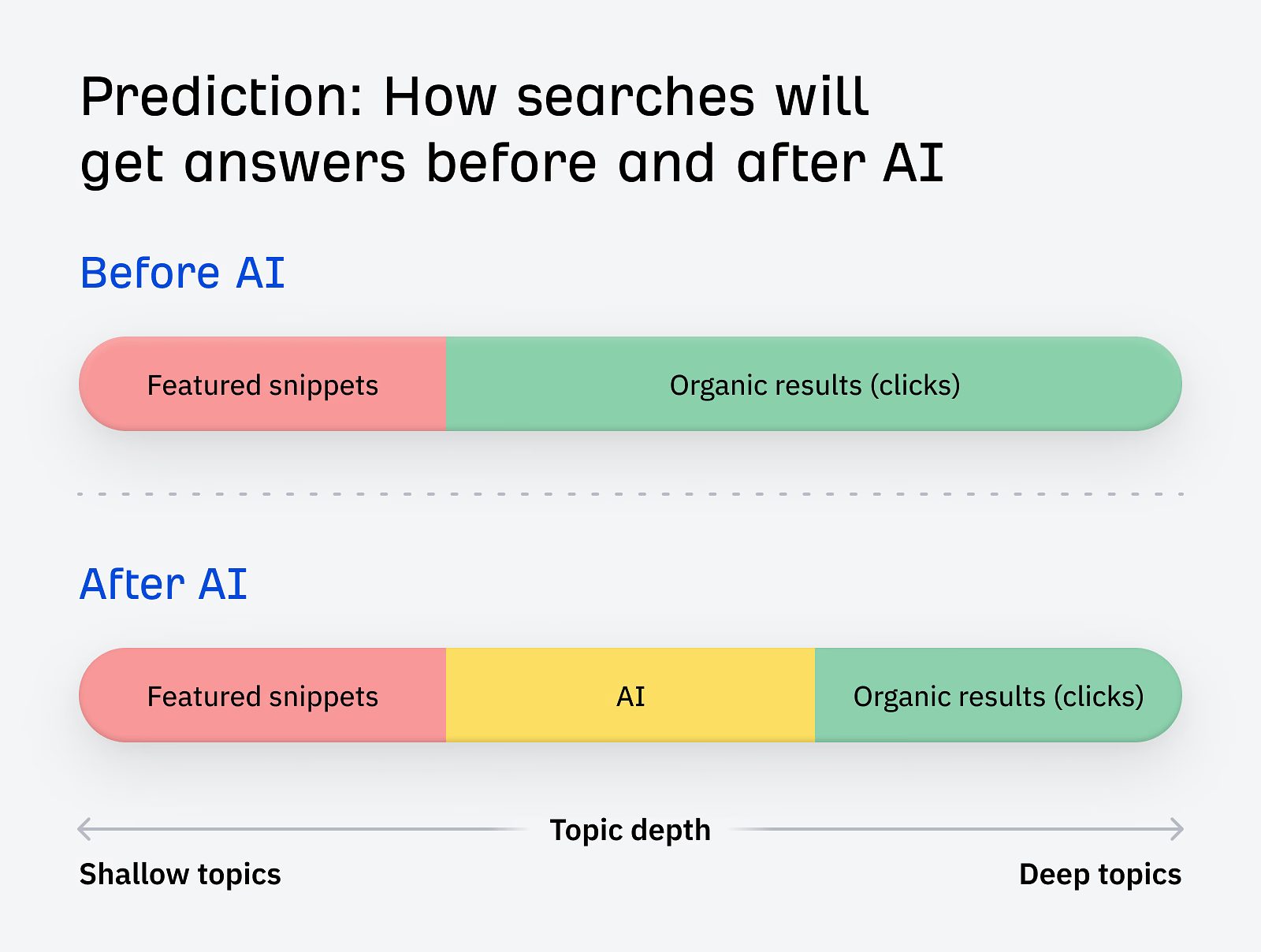
However, as he demonstrates in his article, AI falters when given deeper questions. Joshua argues that SEOs should focus on developing evergreen content that handles these deep questions. By doing so, SEOs can protect their results from being replaced by all the new AI results that are easily generated.
Joshua teaches you to find these deep topics. He argues that it’s about knowing your industry and its concerns well. You can watch for keywords that involve tools, templates, or calculators, as AI will find it difficult to reproduce any of these assets.
There are several reasons besides the already mentioned one to try building more deep content. First, deep content earns more backlinks and has greater potential to draw backlinks than shorter, fluffier content. Second, Joshua argues, Google wants to see deep content and rewards it.
By building deep content, you can build a moat around your most important content, and protect it from being easily reproduced. That concludes the roundup for this month. Check back next month for far more news on SEO, AI, and all the topics that matter to search.



